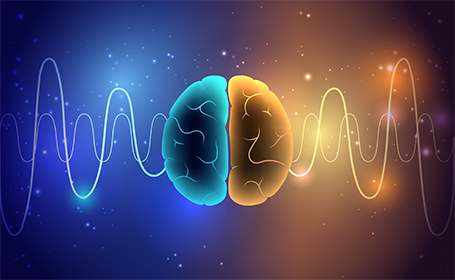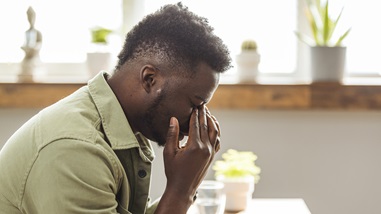
The link between sleep and mental health
Poor sleep can have a significant negative impact on your mental health. Dr Olga Runcie, consultant psychiatrist and sleep specialist, examines the link between the two
Good sleep is crucial to good health, yet all too often people treat sleep as a luxury. If you want to look after your physical health and mental wellbeing in the long term, improving your sleep hygiene is one of the most important things you can do.
Sleep and mental health
Sleep occupies approximately a third of our lives and is essential for healthy brain function and mental wellbeing. Numerous studies from the past few decades have demonstrated the relation between sleep disorders and mental health disorders.
The affects can actually be seen in our brains.
Neuroimaging and neurochemistry studies suggest that a good night's sleep helps foster mental and emotional resilience, while chronic sleep disruptions lead to negative thinking and pessimistic emotions.
The link between sleep and mental health issues is not a new discovery. For a long time, specialists have observed that sleep disturbances are highly prevalent among people with all types of mental disorders. Most patients in psychiatry clinics complain of sleep disturbances.
Similarly, people who seek the help of sleep clinics will very often complain of mental health issues. In one study, 67% of patients at a sleep disorder centre reported an episode within the previous five years. 26% described themselves as currently depressed during the study.
In patients with clinical depression, chronic insomnia is significantly more common. One study put the figure as high as 93%.
Insomnia and mental health
Chronic insomnia is a very common sleep disorder, thought to affect up to 10% of people. Insomnia is classed as chronic when you have problems falling asleep or staying asleep three or more nights a week for three months or more.
In patients with clinical depression, chronic insomnia is significantly more common. One study put the figure as high as 93%.
The same study found that 64% of people with depression suffered from complex insomnia. This is where people have combined difficulties with falling asleep, staying asleep and waking up too early.

Depression and sleep disorders
Depression is closely associated with obstructive sleep apnoea (OSA), a condition where people can't breathe normally during sleep because of obstructions in their airways. Moderate to severe OSA has been found to affect about 14% of people with clinical depression.
One third of people with clinical depression report symptoms of restless leg syndrome, a sleep-related movement disorder. The syndrome presents with unpleasant and uncomfortable sensations in the legs, which are sometimes accompanied by an irresistible urge to move the legs. People normally experience the worst symptoms in the evening and especially at night when in bed.
Hypersomnia is another sleep disorder linked to depression. Symptoms include feeling very sleepy and struggling to stay awake during the day, with people often struggling to function due to sleepiness and fatigue. In one study, 7% of people with depression also reported hypersomnia.
Patients with depression should undergo a rigorous and detailed examination of their sleep history to identify any possible links between the two.
Lack of sleep and severe mental health disorders
Sleep disruption is a recognised risk factor for both the onset and relapse of many psychiatric symptoms and disorders. These include manic or hypomanic episodes, psychotic episodes, and transition to major depression.
A recent study of patients with suicidal thoughts found that the quality of their sleep had a notable impact on the continuation of these thoughts upon wakening. Those who did not sleep as well were more likely to wake up with suicidal feelings.
Sleep disturbances, including insomnia, have been identified as a risk factor for the development of bipolar affective disorder as well as of major depression.
If you are regularly not getting enough sleep and you are suffering from mental health issues, it's important to speak to a professional.
Is poor sleep affecting my mental health?
Most of us will have noticed how being tired can affect our mental ability and mood in the short run. If sleep deprivation is a long-term problem, the effects can be much more serious.
If you are regularly not getting enough sleep and you are suffering from mental health issues, it's important to speak to a professional. The relationship between sleep and mental health is very real, and it can be both significant and complex.
It's important to recognise that impaired or reduced sleep is not just a symptom of various mental illnesses but can actually contribute to the development of many psychiatric conditions, including clinical depression, anxiety disorders, and hypomanic behaviour.
So, disturbed sleep can be hugely detrimental to your mental wellbeing, and it is always worth seeking advice to see whether your sleep habits may play a part in the way you are feeling. Most sleep disorders are treatable, and for many people, successfully treating sleep issues can improve treatment outcomes for their mental health problems.
If you think you could benefit from a sleep evaluation, our sleep studies clinics could help you.
Tags
How do I book an appointment?
If you're concerned about symptoms you're experiencing or require further information on this subject, talk to a GP or see an expert consultant at your local Circle Hospital.